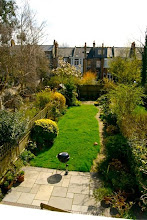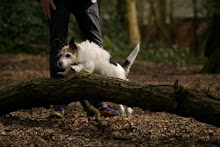Monday, 14 April 2008
After the British Library...
Just back home, and feeling almost too tired to write. Anyway, it was a really interesting evening at the British Library. Rebecca Fraser, who is the president of the Bronte Society, as well as a biographer of Charlotte Bronte, was brilliant at chairing the proceedings, as well as contributing her expertise; and the audience -- an extremely knowledgeable lot -- asked me questions about everything from Freemasonry (Branwell and Symington were both members of a masonic lodge) to spiritualism. There were several descendants of Symington in the audience, who fortunately like the book. They said they saw it as a sympathetic portrayal of him... Anyway, lots to think about tonight... I'm hoping Cristina will pop over from the Bronte Blog, with some more information on Branwell Bronte and Freemasonry.
Subscribe to:
Post Comments (Atom)









5 comments:
Hi Justine,
I'm afraid I won't be much help though. As you well know, Daphne du Maurier - closely followed by Winifred Gérin - was the first to undertake serious research entirely on Branwell. By that time there weren't any first-hand accounts, only possible threads mentioned almost as asides in his sisters' bios. Add to that the fact that the Masons are very secretive of their 'thing' and the results hardly amount to much.
Daphne - with Symington's help - is, I think, so far the biographer to give more importance to Branwell's masonic background at the Three Graces Lodge in Haworth. Other biographies - including the monumental The Brontës by Juliet Barker - seem to tiptoe around the subject, merely listing the scant facts we know about that phase of Branwell's life. Branwell was accepted when still underage and the exception was largely due to the fact that John Brown - his friend and also his father's sexton - was the 'Worshipful Master' and that he was the 'parson's son'. He attended several meetings and acted as secretary to some of them too.
I had to go and check my review of Daphne's Infernal World of Branwell Brontë - a book you probably know better than me - because I had a vague memory of having written soemthing about masonry there:
'Branwell's brush with masonry is well depicted and explained through research into what masonry was like in the North of England at this time. She conveys, both visually and aptly, what the rites would have been and what Branwell would have known at the Three Graces Lodge in Haworth. Nevertheless, du Maurier sometimes, in our opinion, goes too far giving masonic meanings to Branwell's letters or writings.'
It is impossible to know to what extent masonry got under Branwell's skin. Daphne truly believed it had affected him deeply and on many levels. Barker, Gérin don't seem to make much of it, and rather use it to illustrate Branwell's flitting interests.
Not much help, was I?
Cristina -- you are magnificent, as I knew you would be!
'Daphne' (wonderful, have read it twice) has set me brooding about Branwell as I walk the dogs. It made me think again about Branwell's dismissal by Mr Robinson - which precipitated his decline, and after which he never worked again.
Daphne du Maurier in 'The Infernal World of Branwell Bronte' pointed out that he gave two different explanations for being sacked - one to his family and one to his friends - and that Mr Robinson threatened him with 'exposure'. So I wonder - perhaps Branwell had become a sort of stalker to Mrs Robinson - perhaps somebody reported finding him doing something shaming/embarrassing (in her room? among her clothes?).
Daphne used shame, embarrassment, weakness creatively in her fiction. Branwell, whose writing was focussed through heroic, dominant alter egos, creatures of power and dignity, could not. How could he recover after that?
I've wondered about Branwell since reading Juliet Barker's impressive work 'The Brontes' while working on my gt gt grandfather's diaries, intending to produce something on Boroughbridge history I have yet to finish.
I realised suddenly that the Dr Crosby who befriended Branwell at Thorp Green was Crosby, the family friend referred to in the diaries - that Juliet Barker's implicit question, "what sort of man was Dr Crosby?" was one I could answer. One test of the truth of Branwell's claims is to ask whether Crosby was likely to act as go-between for Branwell and Mrs Robinson, and if so, was he her accomplice or her dupe?
If it seems improbable that Crosby took part in the exciting scenes described by Branwell, then, in spite of the discovery of Branwell's letters to John Brown proclaiming his intimacy with Mrs R, the whole matter of Branwell's time at Thorp Green and his dismissal becomes a mystery again!
My article can be found at www.jakesbarn.co.uk - under Articles - in the Great Ouseburn section - for anyone who is curious ...
Alice, thanks so much for posting this very interesting material. I think your suggestions about Branwell are intriguing, and they fill in several gaps. And to anyone reading, I can really recommend checking out Alice's research on the website she mentioned -- it's fascinating.
I'm currently writing a series of articles about Branwell which will go into quite a bit of detail about Branwells and indeed the rest of the Bronte siblings dealings with and influence of the Haworth freemasons. For the research I was invited to take photographs in the masonic lodge in Haworth and these will on-line over the coming months. The articles are being published in the Haworth newspaper and can also be seen on-line here http://www.voiceofthevalleys.net/branwell-alchemist-sorcerer-artist-junkie.html although it will be another couple of articles before it delves deeper into this part of their history.
This started out as a photo essay and as you will easily able to tell, writing is not my first discipline and translating photographs into words is posing some interesting problems ! The articles are not written as a historic resource (thats my disclaimer !) although once completed i will try to reference everything to make them so.
I'd be more than happy to discuss the research ive done and pass on information, i'm sure it could be presented in a much more resourceful way.
ian
Post a Comment